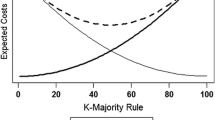Abstract
This essay provides a formal justification for qualified majority rules. Specifically, within an uncertain dichotomous choice framework, in which individual preferences are identical but actual judgments may differ, special majority rules emerge as decision rules that maximize the probability of making correct decisions. The main result specifies the optimal special majority as a function of a priori bias in favor of the status quo, ability, and size of the decision-making body. The analysis of the relationships among these three variables in generating certain common qualified majority rules is then pursued.
Similar content being viewed by others
References
Black, D. (1958). The theory of committees and elections. London: Cambridge University Press.
Condorcet, N.C. de (1986). Essai sur l'application de l'annalyse a la probabilité des décisions rendue à la pluralité des voix. Paris.
Fishburn, P.C. (1973). The theory of social choice. Princeton: Princeton University Press.
Fishburn, P.C., and Gehrlein, W.V. (1977). Towards a theory of elections with probabilistic preferences. Econometrica 45: 1907–1924.
Grofman, B. (1978). Judgemental competence of individuals and groups in a dichotomous choice situation: Is a majority of heads better than one? Journal of Mathematical Sociology 6: 47–60.
Kazmann, R. (1973). Democratic organization: A preliminary mathematical model. Public Choice 16: 17–26.
Rae, D.W. (1969). Decision rules and individual values in constitutional choice. American Political Science Review 63: 40–63.
Schofield, N.J. (1972). Is majority rule special? In R.G. Niemi and H.F. Weisberg (Eds.), Probability models of collective decision making. Columbus, Ohio: Merill.
Sen, A.K. (1970). Collective choice and social welfare. San Francisco: Holden Day.
Straffin Jr., P.D. (1977). Majority rule and general decision rules. Theory and Decision 8: 351–360.
Author information
Authors and Affiliations
Additional information
We would like to acknowledge the particularly helpful suggestions of Peter Aranson. We are also indebted to the anonymous referees for their comments.
Rights and permissions
About this article
Cite this article
Nitzan, S., Paroush, J. Are qualified majority rules special?. Public Choice 42, 257–272 (1984). https://doi.org/10.1007/BF00124945
Issue Date:
DOI: https://doi.org/10.1007/BF00124945




